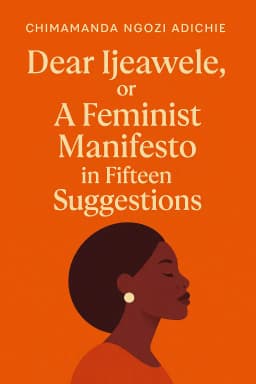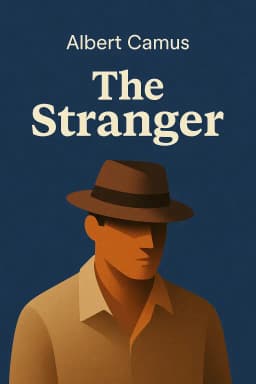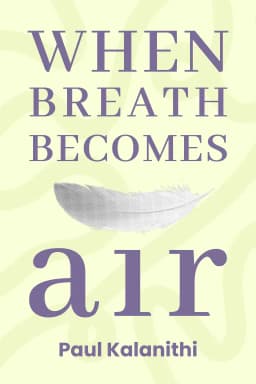
Beyond the Black Turtleneck
An Existentialist Approach to Life
Golden Hook & Introduction
SECTION
Michael: Alright Kevin, pop quiz. When I say the word "existentialism," what's the first image that pops into your head? Kevin: Oh, that's easy. A dimly lit Parisian café, circa 1950. A man in a black turtleneck, probably named Jean-Pierre, smoking a cigarette, staring into a tiny cup of espresso, and thinking about the crushing meaninglessness of it all. Am I close? Michael: You are hilariously, perfectly, and completely on-brand with the stereotype. And that is the exact cliché that our book today is determined to blow up. We're talking about On Being and Becoming: An Existentialist Approach to Life by Jennifer Anna Gosetti-Ferencei. Kevin: Gosetti-Ferencei. That name has some gravitas. What's her story? Is she a Jean-Pierre whisperer? Michael: You could say that, but she's so much more. She’s a professor at Johns Hopkins, but here’s the fascinating part that really shapes this book: she’s not just a philosopher. She has a PhD in German Literature and a Master of Fine Arts in poetry. She's even won a major literary prize for her poetry. Kevin: Wait, a poet is writing about existentialism? That feels… different. I was expecting a dense, academic textbook. Michael: Exactly. She approaches it from this incredibly rich, interdisciplinary place. The book isn't just about analyzing a philosophy; it’s about exploring it as a way to live, through ideas, stories, and even art. And her first mission is to rescue existentialism from that sad café you just described.
Existentialism Isn't What You Think: Beyond the Parisian Cliché
SECTION
Kevin: Okay, I'm intrigued. If it's not all about French gloom, what is it? Where does she start? Michael: She takes us way back, long before Sartre and his contemporaries were famous in Paris. She argues the real roots of this thinking are in the 19th century, with figures who are way more dramatic and strange than you might think. Kevin: More dramatic than pondering the void over coffee? I'm listening. Michael: First, picture Denmark in the 1840s. There’s this philosopher, Søren Kierkegaard. He's a deeply religious man, almost a theologian, and he's obsessed with a single question: what does it mean for an individual to have faith in a world where rational proof is impossible? Kevin: Huh. I always thought existentialism was fundamentally atheistic. The whole "God is dead" thing. Michael: That comes next! But Kierkegaard is the starting point. He introduces this idea of the "leap of faith." The book uses his analysis of the biblical story of Abraham and Isaac. God commands Abraham to sacrifice his own son. From any rational, ethical standpoint, this is monstrous. It's absurd. Kevin: Right, it’s an insane request. No logical person would do that. Michael: Precisely. And Kierkegaard says that for Abraham to obey, he has to suspend all reason, all ethics, and make a personal, subjective leap into the absurd, based purely on his individual faith. That act, that terrifying, lonely choice that defies all external rules, is a profoundly existential moment. It's about the individual standing alone before a monumental decision. Kevin: I see. So the focus is on the individual's internal struggle and choice, not a set of universal rules. It’s about what you do when the rulebook makes no sense. Michael: You've got it. And that sets the stage for the next major figure she brings in: Friedrich Nietzsche, the German philosopher with the legendary mustache who did, in fact, famously proclaim, "God is dead." Kevin: Okay, here we go. This is the part I was expecting. The nihilism kicks in. Michael: But here's how the book reframes it, and this is crucial. When Nietzsche's character, a madman, runs into the marketplace shouting "God is dead," he's not celebrating. He's terrified. He’s saying that the entire foundation of Western morality, meaning, and value—the divine rulebook—has crumbled. And we are the ones who killed it with our science and reason. Kevin: And the people in the marketplace just laugh at him, right? Michael: They do. They don't get the terrifying implication. The madman is asking, "What now? If there's no ultimate judge, no pre-written cosmic plan, how do we know what is good? How do we navigate our lives?" The death of God doesn't lead to a party; it leads to a crisis. It creates a vacuum of meaning. Kevin: A vacuum that we, as individuals, now have to fill ourselves. Is that the idea? Michael: That is the absolute core of it. The book argues that this sense of absurdity, this loss of traditional anchors, is the starting point for existential inquiry. It’s not about wallowing in meaninglessness. It's about facing that meaninglessness head-on and recognizing the immense, and frankly scary, responsibility that comes next. Kevin: So it’s less about "life is meaningless, woe is me," and more about "life has no inherent meaning, so now what are you going to do about it?" Michael: Exactly! And Gosetti-Ferencei shows this thread runs through so many different thinkers, including in African-American literature, exploring themes of freedom and identity in the face of oppressive systems. It's a global, human conversation, not just a French one. It’s about the fundamental human condition of having to create ourselves.
Condemned to Be Free: The Terrifying Gift of Choice
SECTION
Kevin: Okay, that phrase, "create ourselves," feels huge and a little intimidating. It leads me to the most famous line I know from all this, which I think is from Sartre. The one about being "condemned to be free." It sounds like a punishment. Michael: It does, doesn't it? And that quote, "Man is condemned to be free," is the gateway to the book's second major idea. To really understand what Sartre meant by "condemned," we have to look at where he was when he was developing these ideas. It wasn't in a comfortable university office. Kevin: Let me guess, it was in that smoky Parisian café. Michael: It was in Nazi-occupied France during World War II. And the book uses his story to make this concept brutally real. In 1939, Sartre was drafted into the French army. He was a philosopher, an academic. A year later, he was captured by the Germans and spent nearly a year as a prisoner of war. Kevin: Wow. Okay, that's a world away from just thinking about ideas. Michael: When he was released, he returned to a Paris under occupation. And he was faced with a choice that was not abstract in the slightest. He could keep his head down, continue his life as a writer and teacher, and implicitly comply with the Nazi regime. Or he could resist. Kevin: A choice where the wrong answer gets you tortured and killed. Michael: Exactly. There was no neutral ground. Even choosing to do nothing was a choice—a choice to be complicit. He couldn't avoid it. He was forced to choose what kind of person he was going to be. This is the "condemned" part. You are thrown into existence, into situations you didn't ask for, and you cannot escape the necessity of making choices. Kevin: So what did he do? Michael: He joined the French Resistance. He, along with other intellectuals like Albert Camus and Simone de Beauvoir, formed an underground group. They weren't throwing bombs; they were writers. Their resistance was intellectual. They wrote and secretly distributed anti-Nazi propaganda and underground newspapers. Every pamphlet they printed, every meeting they held, carried the risk of death. Kevin: That's incredible. He was literally putting his life on the line for his ideas. Michael: He was living his ideas. The book explains that this experience was the forge for his philosophy. He saw that freedom wasn't some pleasant, abstract concept. It was a terrible, unavoidable burden. He was free to define himself as a coward, a collaborator, or a resistance fighter. The meaning of his life wasn't pre-given; it was being forged in every single one of those terrifying, high-stakes decisions. Kevin: So "condemned to be free" means you're stuck with the steering wheel. You can't hand it over to your parents, or your boss, or your government, or even a divine plan. You have to drive, and you're responsible for wherever the car ends up. Michael: That's a perfect analogy. And you're responsible not just for yourself, but in a way, for all of humanity. Sartre argued that when you choose a path, you are implicitly saying, "This is how a human being should act." You are creating a value for everyone. When he chose to resist, he was making a statement about the value of freedom over the value of his own survival. Kevin: That's a heavy weight to carry. I can see why "condemned" is the right word. It’s not a gift you can return. But how does this apply to us now? Most of us aren't facing down a totalitarian regime. Our biggest daily choice is what to watch on Netflix. Michael: That's the million-dollar question, and it's where the book really brings it home. The intensity of Sartre's situation just makes the principle crystal clear. But the principle itself applies to every moment of our lives.
Synthesis & Takeaways
SECTION
Michael: The book argues that we are still "condemned to be free," even in our modern, seemingly comfortable lives. We just pretend we aren't. We tell ourselves, "I have to stay in this job I hate," or "I have to act this way because it's what's expected of me." Kevin: We create our own cages. We say, "I have no choice," when really, we're just afraid of the choice that's in front of us. Michael: Precisely. We are constantly making choices that define who we are. Choosing to scroll on your phone for an hour instead of talking to your partner is a choice. Choosing to pursue a creative project on the weekend versus just recovering from the work week is a choice. Each one is a small act of self-creation. Existentialism, as Gosetti-Ferencei presents it, is the practice of becoming aware of these choices and making them authentically. Kevin: Authentically meaning, in line with the values you've chosen for yourself, not the ones society handed you. Michael: Exactly. And the book points to modern data that backs this up. It mentions a Pew Research study on where people find meaning. While family is a huge source for many, people also find it in their careers, in their hobbies, in spirituality, in social causes. There's no single, universal source of meaning. Kevin: Which proves the existential point. There is no one-size-fits-all answer. We are all tasked with the project of building our own meaning from the materials of our lives. Michael: That's the heart of it. The book's ultimate message is an empowering one. It strips away the gloomy stereotypes to reveal a philosophy that is about radical responsibility, creativity, and the profound freedom to become who you choose to be. It’s not about the meaninglessness of life; it’s about the challenge and the beauty of creating meaning where there is none. Kevin: So, the big takeaway is to stop waiting for a pre-written life script. Stop looking for someone or something to tell you who to be or what to do. Every choice, from what you do this evening to what career you pursue, is an act of authorship. You're writing the story of your life, sentence by sentence. Michael: Beautifully put. And maybe the most practical first step is just to notice it. To pause and ask yourself in any given situation, "What choice am I making right now, and is it an authentic one?" It’s not about making every choice a monumental drama, but about recognizing your own agency in the small moments that make up a life. Kevin: It's a powerful and, honestly, a hopeful way to look at the world. It’s a lot of responsibility, but it’s also the ultimate form of freedom. Michael: It is. And perhaps the question to leave our listeners with is this: If you were to look at your day today as a series of choices you made freely, what story did you tell about who you are? Kevin: This is Aibrary, signing off.









